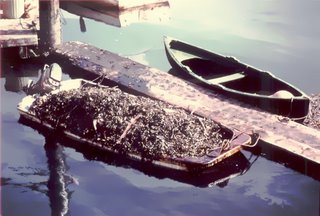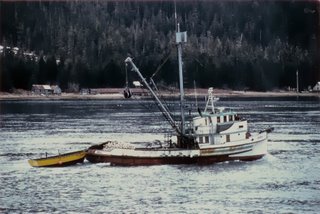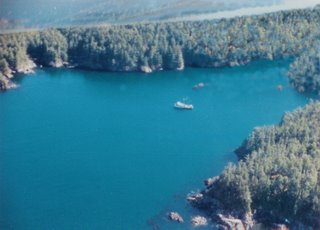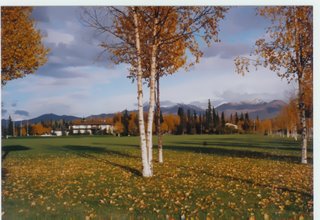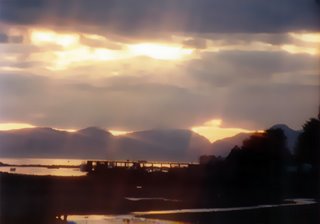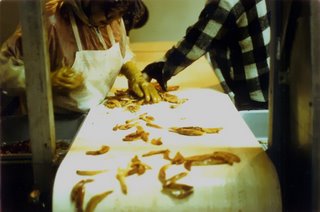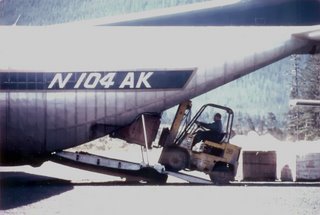Hunting the NOBLE crab rats: Part II
 John, here is part 2 of the AFA(American Fisheries Act) scandal. Part one ended with how a simple error on a fish ticket could land a regular fisherman in jail, fined heavily or both. Let's look at what happened to Ben Stevens when he masterminded the (not so) clever circumvention of AFA, the same law his own father made to restrict trade by limiting who can buy crab from an independent fisherman. (Why would you do that?)
John, here is part 2 of the AFA(American Fisheries Act) scandal. Part one ended with how a simple error on a fish ticket could land a regular fisherman in jail, fined heavily or both. Let's look at what happened to Ben Stevens when he masterminded the (not so) clever circumvention of AFA, the same law his own father made to restrict trade by limiting who can buy crab from an independent fisherman. (Why would you do that?)This picture of eagles in front of my parents house in Petersburg reminds me of how far down the food chain the 99.9% of us have fallen, considering how much a couple of guys get under AFA and Crab ratz. And we never thought nobility was allowed in the U.S.! If the AFMB has given away $29M, and the fishermen's RSDA have only gotten a couple hundred thousand, where has it all gone? Maybe this is a hint: Bobby covers Icicle's bases and Ben and Trevor cover Tridents?
There is now a clear record of depositions from the legal battle surrounding Adak Fisheries, Adak Fisheries Development Corporation and Aleut Corp. From those records, and from State of Alaska records, you can see a shocking example of the type of scheming that goes on with the American Fisheries Act, which, as I've said before, has nothing to do with the health of any fish stocks, it is solely designed to allocate resources among favored companies, and to eliminate any new buyers of pollock and crab.
For example, Icicle Seafoods became a 50% shareholder of Adak Fisheries LLC for $500,000 with Kjetil Solberg, who was holding an option for Ben Stevens to buy 25% also for $500,000. Bobby Thorstenson Jr.,one of the largest stockholders of Icicle, had employed Ben as a lobbyist on behalf of Southeast Alaska Seiners Assn and United Fishermen of Alaska (Bobby is president of UFA). Bobby also sits on the same Alaska Fisheries Marketing Board (AFMB) as Ben Steven and Trevor McCabe, this is the funny money fund discussed in the last letter, note that Icicle Seafoods has been getting their share of "grants".
This group of Icicle, Adak LLC, Solberg and Ben Stevens then set about illegally buying more than 4,000,000 lbs of king crab when, under AFA, Icicle's limit was 221,000 lbs in the Adak facility (which this group now owned.)When caught they said "Solberg's Adak LLC was in charge of crab, and Icicle was in charge of the cod purchasing." (This in the same plant.) However, Solberg said in a deposition that he was there for the cod, which he was familiar with, and which was very valuable in Norway, and that Ben had suggested buying king crab. Ben has been paid hundreds of thousands of dollars to represent crab groups, and when the press questioned Ted about Ben's substantial fees and whether they reflected access to his father, Ted said no, Ben is an expert on crab. Now suddenly the Norweigian cod guy is there for the crab, and our big crab expert is doing the cod?
Normally, lying to investigators is a bigger crime than the fraud. So what happened? Icicle and Adak LLC got fined $3,400,000 - less than a dollar a pound. No criminal charges of any kind. No mention of Ben Stevens. What kind of cover up is this? I can tell you from personal experience that this is some very special treatment. I also heard that several of NOOA cops were shocked when ordered to drop 43 counts of criminal conduct against the group, along with a $20,000,000 fine.
How does this story end? Ben gets an increased bonus from the group, Icicle sells back their stock to Solberg for $4,300,000 in June of 2004. Then Icicle starts getting more "grant" money from AFMB - since the AFMB refuses to report to whom they have granted the $29,000,000 spent so far, we can only guess. I have heard rumors that most of the money went to Trident, Icicle, and HighlandLite/Yardarm Knot.
At the start of 1998 there were about a dozen companies processing 2.4 billion pounds of pollock annually in the Bering Sea, which was the capped amount, and everyone agreed the resource was in great shape, as it still is today. In round numbers this is about $1,500,000,000 a year. I will say that again: 1.5 Billion dollars a year. This is huge compared to the crab stocks, now or back at their highest level. Today under AFA 50% of the resource is set aside for three shore-based companies: Maruha, Nippon Suisan and Trident.
AFA granted to Trident a share of the resource valued at over $300,000,000 a year, without free market competition. Is that not the best gift ever? Three hundred million a year. This new special set-aside makes shore-based plants look great. Too bad the current EPA laws have stopped any new plants in Alaska since Maruha's Westward Seafoods in 1990. What would a site for a pollock processing plant be worth now?
Because of Trident's efforts in the 1980s to push out all other processors around Akutan Bay*, the ability to get a permit to build a shore-based plant anywhere was nearly impossible. This left no choice but to build or buy a large catcher/processor vessel if you want to process pollock. In 1987 this was legal, as was selling to foreign factory ships (who had the right to process only, not to catch) and there was a large fleet [about 100] of smaller mostly family-owned catcher boats, many of which had been converted from crabbers. Trident and Tyson Seafoods started a huge lobbying effort to stop these groups of fisherman that were getting together, pooling resources and buying some of these large boats to process their catches. Remember that is how Chuck got started and he clearly does not want any kind of competition.
Once again Ted jumped into action to close this "terrible loophole" so no longer could fishermen buy or convert these large boats, except this bill (Anti-Reflagging Act, 1987) was so poorly written (like many of Ted's bills) that with a "now or never" deadline looming, more of these big projects went forward in a rush than should have. By 1990 no new offshore ships were added to this fleet and by 1996 some of the ships that were hurridly re-designed or poorly capitalized started having problems. While the independent offshore fleet was shrinking, Trident, Maruha and Nippon Suisan were rapidly increasing the size of the pollock plants, and promising part of their shore-based market to the smaller family-owned catcher boats in order to keep them quiet about losing the offshore markets through this Act. Instead they built a number of very large RSW catcher boats which was the nail in the coffin for the independents. So this Act, which was really to help Trident shore-based, greatly helped the other 2 Japanese shore-based operations as a by-product - that's the irony, every time Ted helps Chuck, it also helps these huge Japaneses conglomerates (who controlled 70% of the inshore pollock.) Because pollock was already split into an onshore and offshore quota pool, this new, expanded inshore fleet started making quick work of the onshore quota and the fishing days dropped from 148 days to only 74 days (1997) while the total Bering Sea offshore factory processing declined from a high of 65% to 48% in 1996.
So these are the facts, but Chuck might lose money if his days keep dropping, so back to Washington to see Uncle Ted, and guess what? Offshore factory ships were to blame, they must be catching fish that should be Chuck's, it was all their fault, so those evil Norwegians (owners of the biggest factory ships) must go (see ADN headlines from 1998). Ted gets Congressman Young, Chair of Transportation, to hold hearings on this problem of too many factory ships, saying "we must punish these speculators." (One good response was this testimony: "It is now being speculated that speculation occurred." And Ted's response: "Those guys should have read the intent of my (Anti Re-flagging) bill instead of reading the words as written". (!)
Somehow these offshore guys (primarily Norwegian), were bad, and shorebased guys (primarily Japanese, plus Chuck's Trident) were good. Now of course this makes shorebased plants a very safe place, too bad Ben does not have one, oh wait a minute now he does, the $3 Billion Adak Navy base (built at taxpayers expense).
It does not seem to bother Ted that for each extra dollar that is manipulated in Chuck's direction (at the expense of every indepedent fisherman that is deserted or forced to sell out) the Japanense get two.
So what happened after this dog and pony show to punish "speculators"? Ted gets an invited-only group into his office (the war room), walks in, looks at everyone and says "10% of Bering Sea pollock goes to CDQ, I want 50% of the remaing quota to go to shorebased, and I don't care what you do with the rest." This group drafts the AFA. Trevor McCabe, Ted's head fish guy, agrees with Mike Hyde (President of American Seafoods, Norwegian owned) to a federal/industry buyback of 8 of American Seafoods' smaller factory ships for $80,000,000.
The offshore fleet was split into 10% of the quota for the mother factory ships and 40 % for the catcher/processor factory ships, of which American Seafoods had several. Now this buyback deal was pretty good, so Mike Hyde, in later meetings with Trevor McCabe (October 1998), got an agreement to add another American Seafoods ship to the buyback agreement for another $10,000,000. AS didn't yet own this boat to be bought back, they simply had an option to buy Factory Ship Browns Point for $2Million, a very good deal since they did not have to put up any real money, and they had a guaranteed sale for $10 Million (all of which Trevor McCabe knew.) I wonder where that last minute, extra $8Million went? Shortly thereafter Trevor McCabe left Ted Stevens' office to go to work for - guess who? The off-shore lobbying group At-Sea Processors. Who are the real speculators?
I guess Ted showed how smart he was in punishing American Seafoods by buying up the junk boats, letting the other boats in their fleet get the quota from the scrapped boats, and giving them $90 Million -and I guess he doesn't have a problem with Trevor's good luck getting a job for the group after orchestrating this deal. I guess it's fair that American Seafoods now flies Ted Stevens' relatives around in their 737 private jet.
Talk about punishing speculators - how about the speculators that brought national scorn to Alaska when it was found out that relatives and former staff members had been buying up land where the "bridges to nowhere" were to be built? These speculators - Art Neslon (Don Young's son in law), Trevor McCabe, Mike Hyde, Al Chaffee (Highland Light&Yardarm Knot, one of the biggest winners in Crab Ratz), make quite an interesting partnership, or how about Trevor's sweetheart deal at the Seward Sealife Center that is getting huge free money both from Ted's federal grants and also from Trevor and Ben's own funny money AFMB. Trevor McCabe's no-bid contract to supply the charter boat to federally funded Seward Sealife Center is a "can't lose" - as anybody knows.
Part 3 (coming soon to a blog near you): how to give your son a really big Navy base and lots of free fish, or if he screws that up, Plan B: How to earmark hundreds of millions to the Navy and order them to lease that same base back from Ben.
*{After doing things like getting laws changed for cargo ships to probated offloading floating processors, getting EPA to grandfather only [Trident] waste discharge water. The very best was making the last company, Deep Sea fisheries, prove with costly studies, that the grass on the hillside would not be damaged from air exhaust from adding another shore based genset. How could anyone think killing the grass on a hillside, in one of the windiest places in the world, that every 10 years or so has a volcano shoot ash and spray rocks down, could be a reason not to get a permit to processes fish. So in 1989 a permit would take years and millions of dollars, with no guarantee of getting one}.
